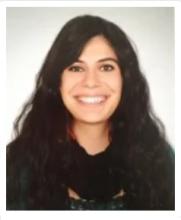Professional summary
Cansu Uluseker integrates her background in mathematics with a focus on environmental modelling. At the UK Centre for Ecology & Hydrology (UKCEH), Cansu Uluseker contributes to predictive modelling, focusing on environmental systems. Here, she applies her knowledge as an environmental contamination modeller.
After earning her BSc in Elementary Mathematics Education from Middle East Technical University (METU) in Turkey in 2011, Cansu's academic path led her to the PhD position at the University of Trento, collaborating with the Microsoft Research Center for Computational and Systems Biology. Her doctoral research was a blend of theoretical work and practical application, developing a framework for simulating and analysing biological regulatory systems. She constructed a multi-level model of glucose homeostasis and mapped the transcriptional regulatory network of the Escherichia coli phosphate starvation response, including hands-on work in synthetic promoter design.
After her PhD, Cansu joined the University of Stavanger in Norway as a Postdoctoral Fellow within the JPIAMR project Genegas, sharpening her focus on antimicrobial resistance. She explored mathematical modelling to predict the spread of resistance genes in wastewater treatment environments. Continuing her postdoctoral journey, Cansu became a Research Associate at the University of Birmingham, contributing to the AMRflows UK-India project. Her work involved developing models to understand and predict AMR dynamics and antibiotic concentrations in India's river systems, in collaboration with IIT Madras.
Web tools and apps
Cansu Uluseker is a mathematical modeller, currently serving as an environmental contamination modeller at the UK Centre for Ecology & Hydrology (UKCEH). Her extensive expertise in computational modelling is grounded in her robust use of web tools and applications critical for predictive environmental modelling.
Key Tools and Applications:
• Mathematical Modelling Software: Proficient in advanced modelling software that facilitates the simulation of environmental processes and biological systems (MATLAB, Python, ArcGIS).
• Data Analysis and Visualization Tools: Skilled in utilizing data analytics platforms to interpret complex datasets, enabling clear visualization of model outcomes (R for Statistical Computing)
• Collaborative Research Platforms: Experienced in leveraging online collaborative tools for effective coordination in international and interdisciplinary research projects (Git and GitHub).
Cansu Uluseker is a mathematical modeller, currently serving as an environmental contamination modeller at the UK Centre for Ecology & Hydrology (UKCEH). Her extensive expertise in computational modelling is grounded in her robust use of web tools and applications critical for predictive environmental modelling.
Key Tools and Applications:
• Mathematical Modelling Software: Proficient in advanced modelling software that facilitates the simulation of environmental processes and biological systems (MATLAB, Python, ArcGIS).
• Data Analysis and Visualization Tools: Skilled in utilizing data analytics platforms to interpret complex datasets, enabling clear visualization of model outcomes (R for Statistical Computing)
• Collaborative Research Platforms: Experienced in leveraging online collaborative tools for effective coordination in international and interdisciplinary research projects (Git and GitHub).
